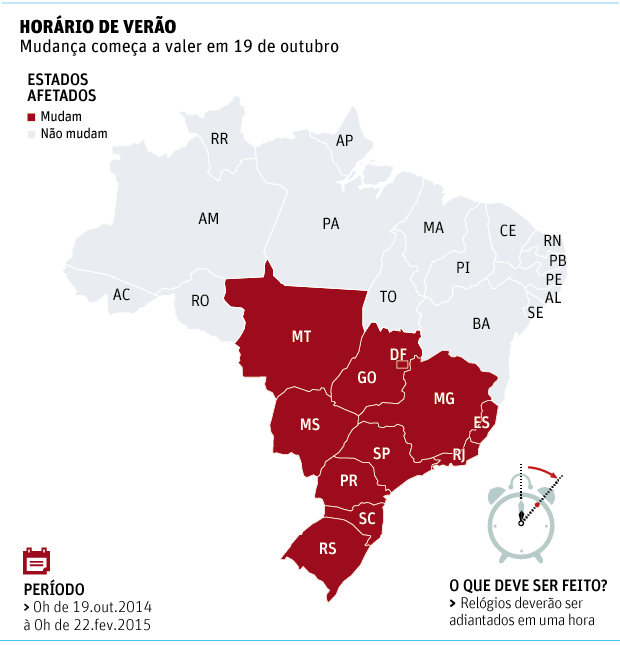Latest Photo Galleries
Brazilian Markets
17h36 Bovespa |
-0,07% | 124.646 |
16h43 Gold |
0,00% | 117 |
17h00 Dollar |
+0,29% | 5,1640 |
16h30 Euro |
+0,49% | 2,65250 |
ADVERTISING
Drought Should Compromise Daylight Saving Time
10/15/2014 - 08h34
Advertising
SOFIA FERNANDES
FROM BRASILIA
The daylight saving time (DST) this year, beginning at midnight next Sunday (19), might mean less savings than last year, due to severe drought, said on Tuesday (14) the Secretary of Electric Energy, Ildo Grüdtner.
With the power plant reservoirs running low, more thermal plants had to be initiated this year. These energy sources are more expensive, and more polluting.
According to Grüdtner, the expectation is that reducing the use of thermal power plants due to DST will generate savings of US$125 million. In the last DST, the government estimated US$182 million savings.
"In fact, given the hydrological situation this year, we have greater thermal demand. Consequently, reduction in consumption will be a bit lower," said the secretary.
In the South, demand reduction at this period is estimated at 625 MW, equivalent to 75% of Curitiba's demand.
The government also sees savings of US$1.8 billion with investments no longer needed as with the construction of power plants to meet the demand.
At midnight next Sunday (19), Brazilians living in the South, Southeast and Midwest should forward their clocks in one hour.
According to the Ministry of Mines and Energy, moving forward the conventional time reduces the power load in the transmission and electrical distribution network systems during peak consumption.
The idea is to take advantage of the brightness of the day during this period to use electricity more efficiently.
By law, the schedule should end on the third Sunday of February, but since on 2015 this date will be Carnival, this schedule will continue for another week, until the 22th of that month, when clocks will be delayed in an hour.
This will be the 39th edition of the DST.
Translated by SIMONE PALMA
Read the article in the original language
| Editoria de Arte/Folhapress | ||
 |



